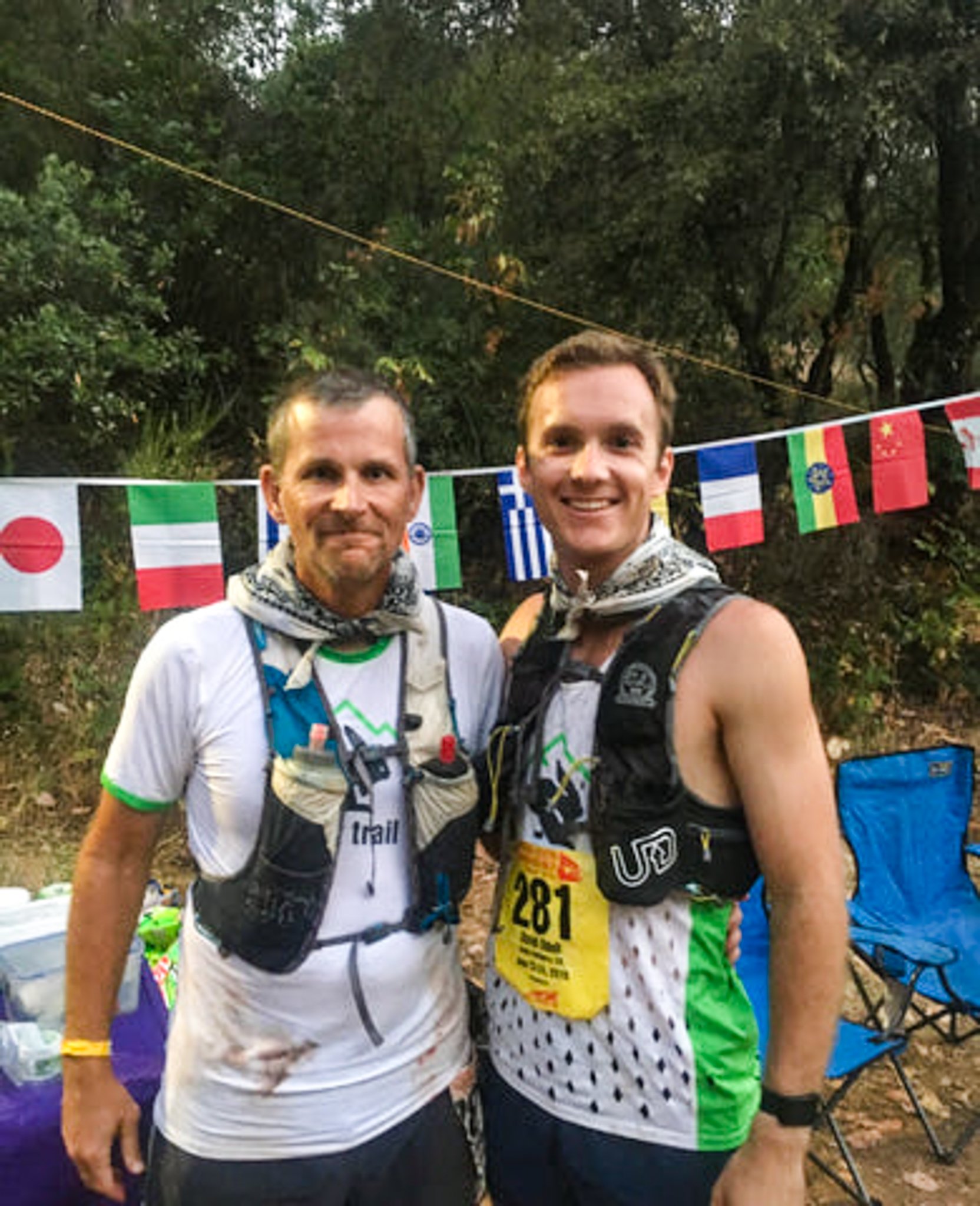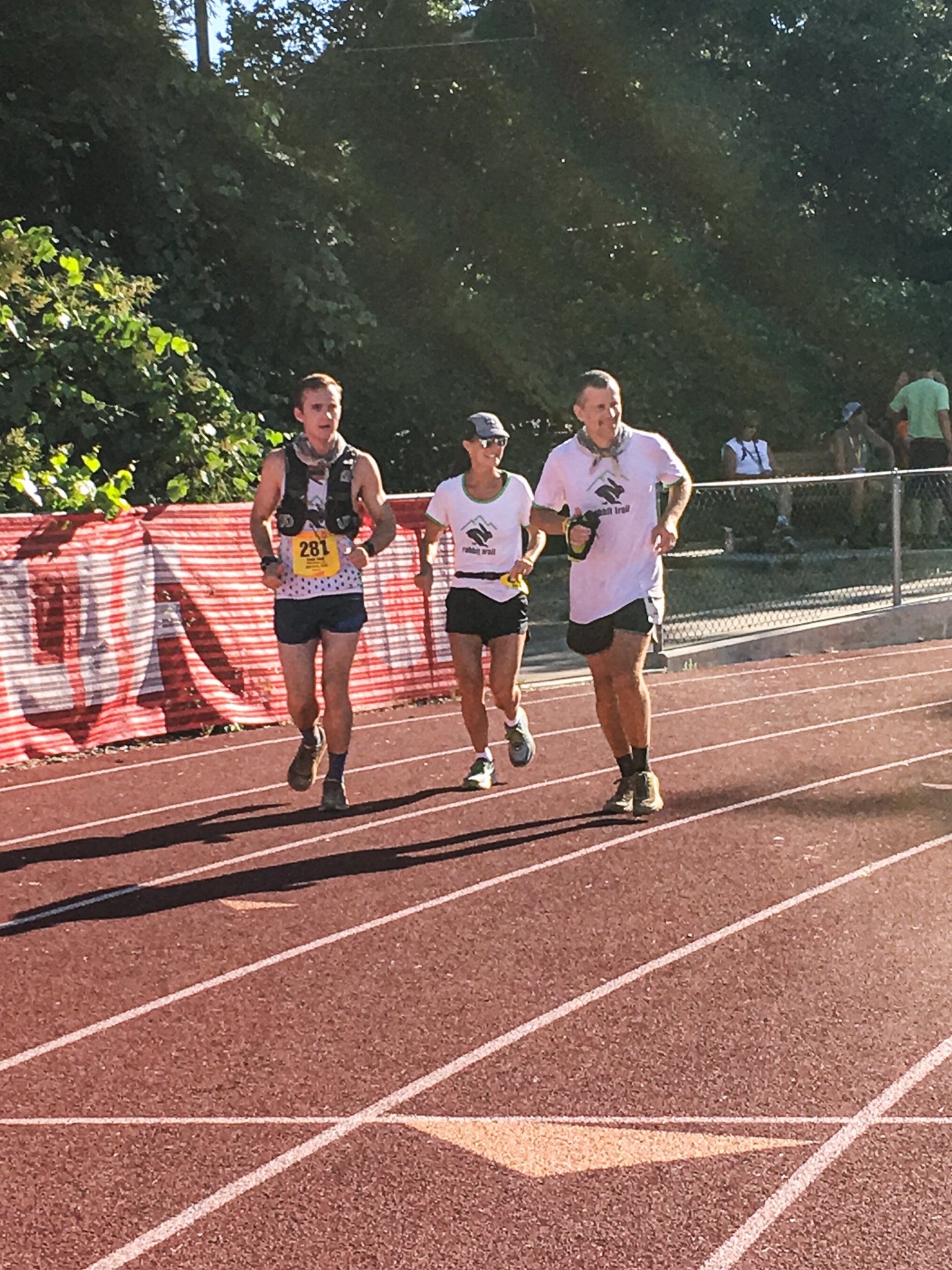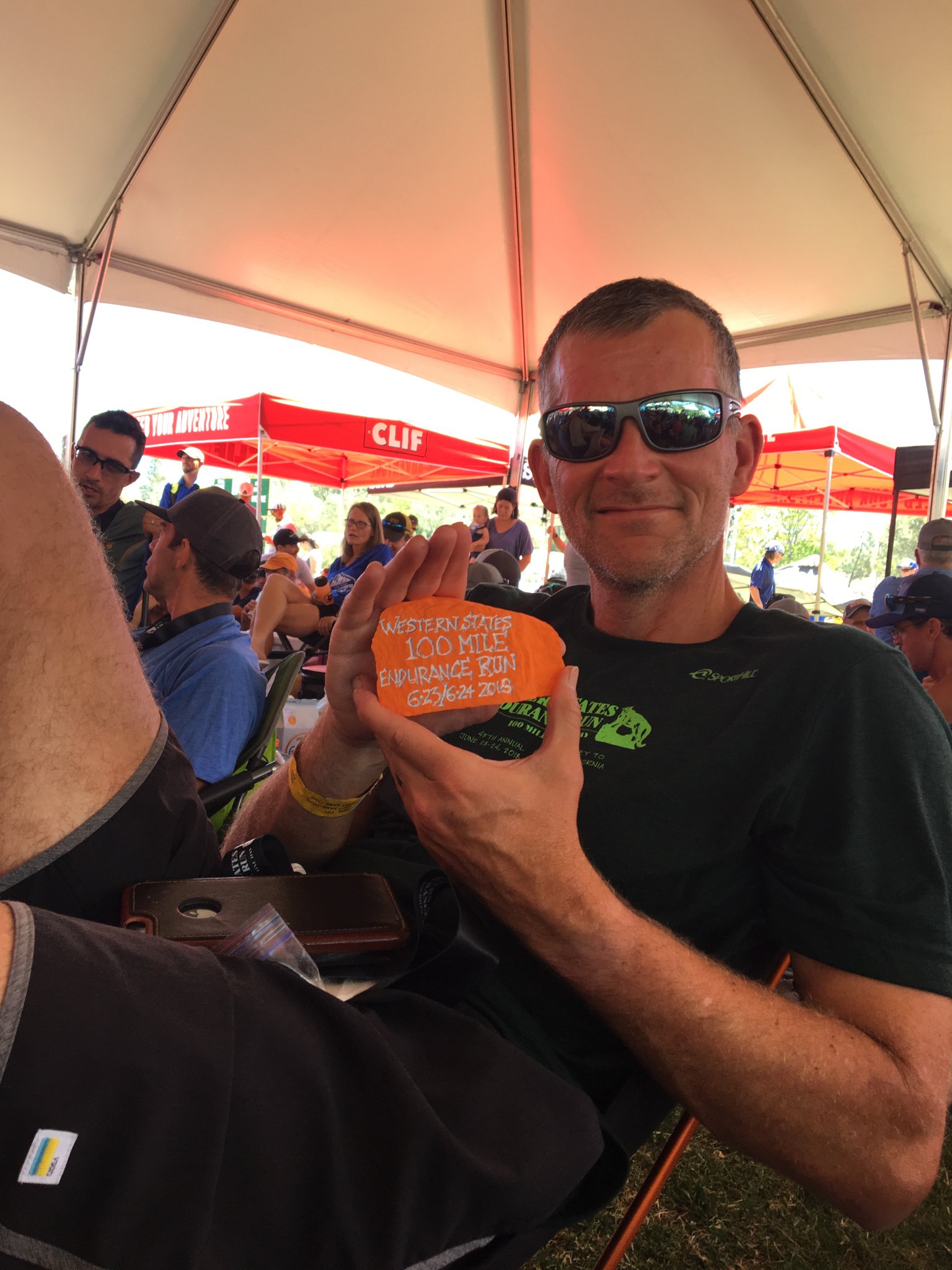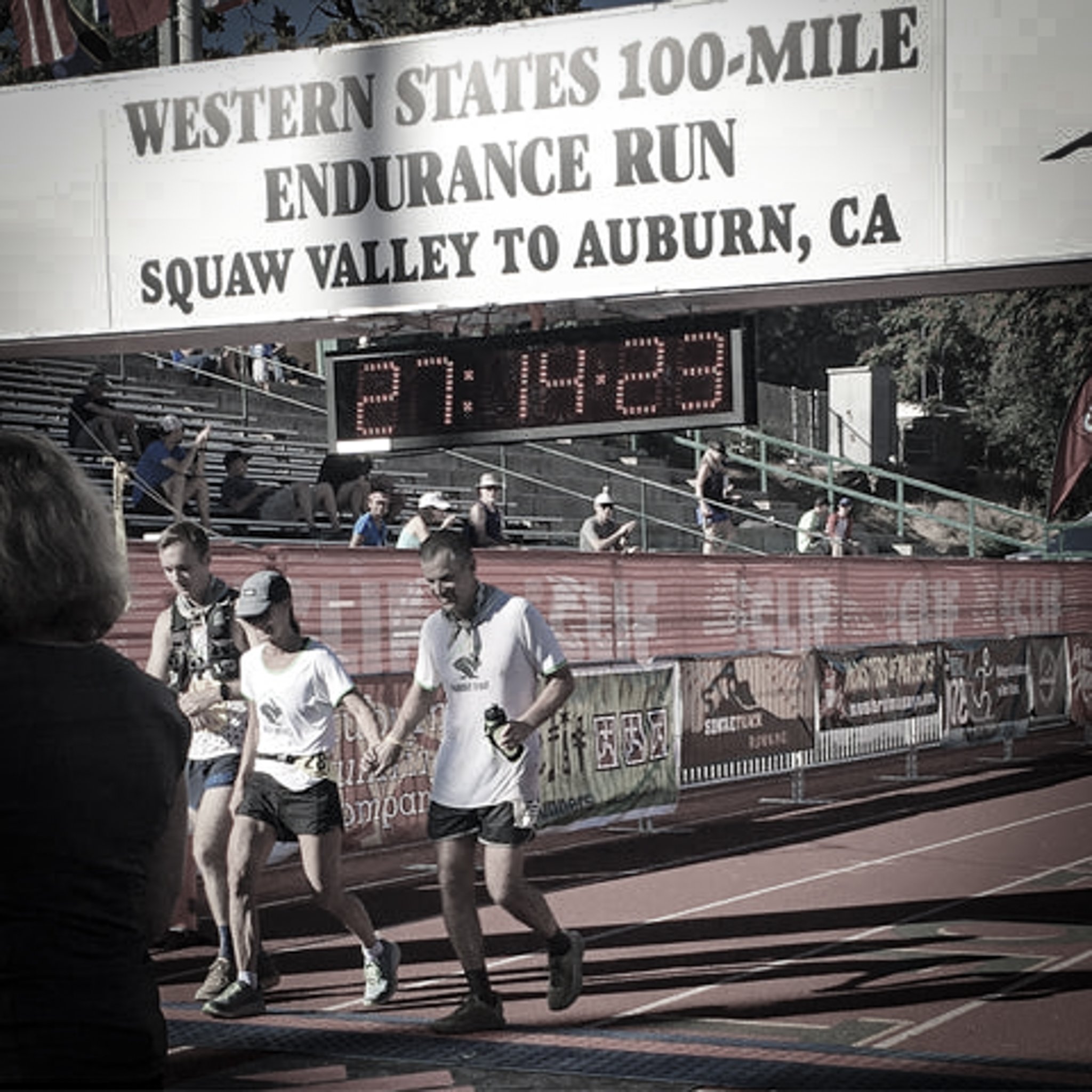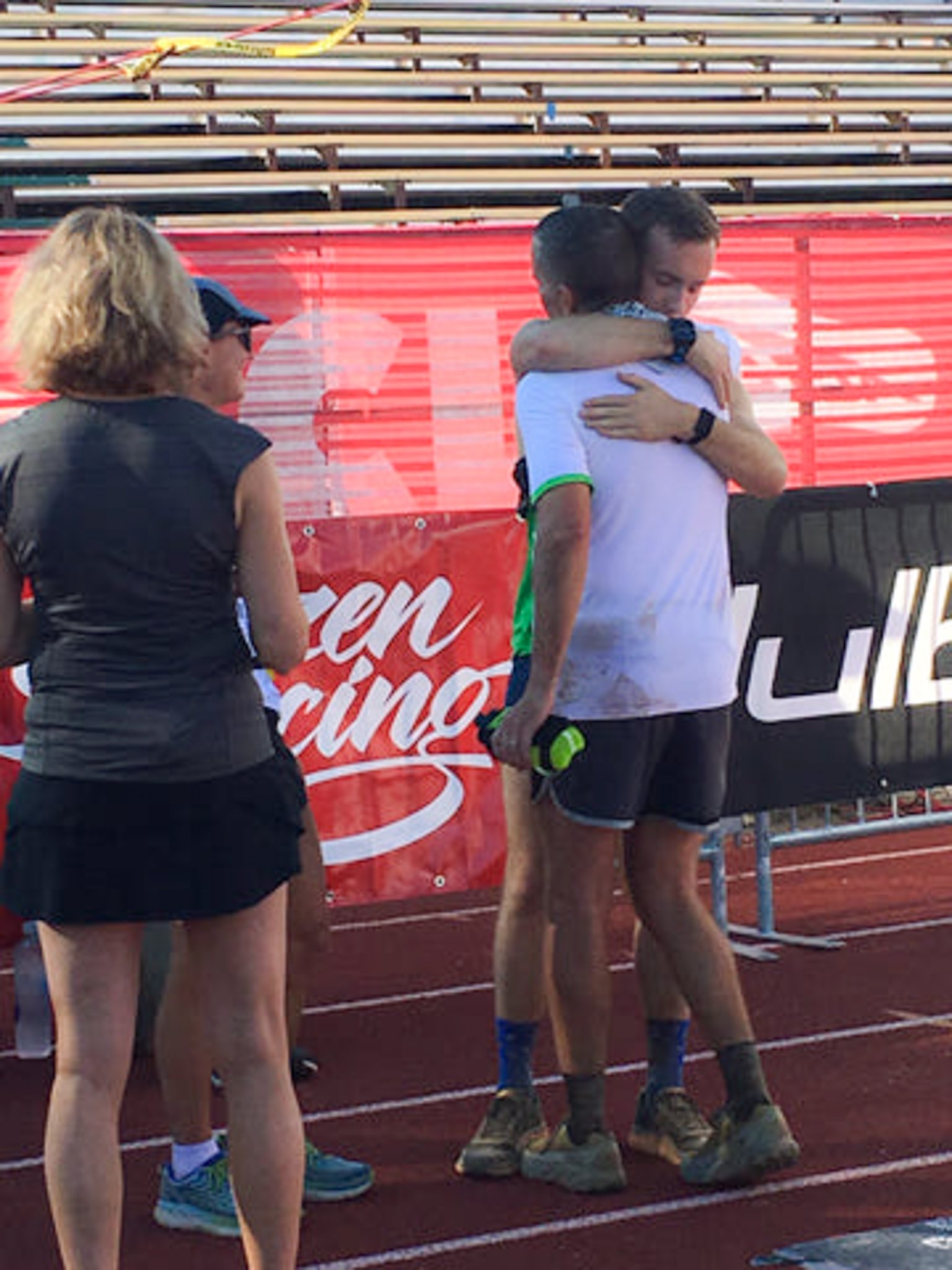The Pacer
At Michigan Bluff, 56 miles into my first (2018) Western States 100 Mile Endurance Race, the temperature was in the upper 90s, I was overheated, under hydrated, and my hips and glutes had cramped up - all par for a 100-mile ultra-marathon course, I know. But not typical (at least for me) were the pebbles in my shoes that caused me to hobble through the last few miles – pebbles that turned out not to be pebbles at all, but blisters that had erupted across the mid-section of both of my feet. With 44 miles left in the race, I was not, as they say, sitting pretty. But I knew that if I could just make it six more miles to Foresthill I’d get relief: That’s when I’d connect with my pacer who would hopefully shepherd me through the most difficult 38 miles of the race. Though my pacer for Western States was a rookie, I was thrilled to have him along: My twenty-one year old son, Walker.
Walker’s a senior at Babson College in Massachusetts, is a very good athlete (he qualified for the Boston marathon twice in the last 3 years), and in the world of coding is a genius – at least in the humble opinion of his father. And we’re very close, especially when it comes to sports. I coached Walker in basketball from kindergarten through high school, we’re both deep into soccer, and thankfully he humors me my Dodger baseball obsession. However, over the last year, Walker has come into his own, college and the people he’s met there, the experiences he’s had, have done their job, he’s grown into his own man. In Walker’s case that meant questioning long-standing beliefs and values – ones I instilled in him and still hold to be true. Naturally, this created some space between us and many of my training runs in the fire charred, mud slide stricken hills of Montecito were spent in deep thought over such things.
Ask 1000 ultramarathon runners why they endure the extreme challenges of their sport, and you’ll likely get 1000 different answers. Me, I’ve always been an athlete, always looked for the next mountain to climb. Basketball was my sport through college, and after, I cycled and raced in a few triathlons. But when I married DeAnna Morfoot, a terrific college cross country runner, running together became important to us. We don’t drink or party or go to the movies much, so running is our sacred time together. Five years ago, for our 20th anniversary, we signed up for a crazy 5-day, 120-mile paired stage race called, Transrockies Run. For DeAnna who is a natural born distance runner, the race wasn’t that tough, because the rules required that partners must stay together, so she just sat back with me and cruised. In any other race, DeAnna would have left me in the dust.
Transrockies proved such an amazing experience - the people, mountains, the challenges we faced together - DeAnna and I were hooked, so we started signing up for races. Out of the gate, DeAnna proved she’s one of the top runners in her age group, but for me things weren’t so easy. But then I was never supposed to be able to run distance.
I’m a different animal than most ultramarathon runners. An altered species. The same year Walker was born, I had my colon surgically cut out of me. Doctors took a section of my small intestine and out of it fashioned what’s known as a J pouch, a reservoir designed to do the job my failed colon used to. I’ve existed this way now for twenty-one years. I bring it up, because my doctors told me that one side-effect of being colon-free is that I would dehydrate more rapidly than non-J pouch people, especially during longer bouts of exercise. And during those bouts, if the weather’s hot, well, things could get really bad. Dangerously bad.
And so because I’m prone to dehydration, the Western States 100 would be my biggest challenge to date. Sure, I’d done the Cascade Crest and the Leadville 100’s, both on paper tougher than Western States, but the latter race is known for being a hot one, and in 2018, a record year of heat and fires everywhere in the state, the thermostat got turned up to extra high – record high in some places - just in time for the race. Lucky me.
Western States begins at Squaw Valley ski resort at north Lake Tahoe, elevation 6,200 feet. On the day before the race, I looked square in the face of the mountain I’d run up the next morning, much like a fighter might watch his opponent’s last bout for measure. Then Walker and I took a little upslope run to see how it felt. We were like two boys on an adventure, getting ourselves all jacked up and ready for the next day. About midway, I looked back at the view of Lake Tahoe from on high, knowing I wouldn’t allow myself such an indulgence during the race, and for the first time I appreciated the immensity of the Sierra’s largest body of water. I also noticed, however, how warm it was so late in the day, 8,000 feet up the mountain.
Running a 100-mile race, unless you’re one of the top finishers, means pulling an all-nighter, so it’s vital that the night before you get a good night’s sleep. But on pre-race eve, I laid awake staring at the hotel room’s cottage cheese ceiling, replaying the words I’d heard veteran Western States racers say earlier at the mandatory race meeting, and repeated later around the rabbit trail team’s pre-race dinner, that the race would probably be the hottest on record. Clearly their forecasts gave me the jitters. I barely slept that night.
At the start line in Squaw Valley the next morning, the temperature was a cool forty-seven degrees. And while I had had dreams of a finish time in the 25-hour range, a pesky infection in the aforementioned J Pouch I had developed the week before meant racing under the influence of chemistry-altering antibiotics, so I adjusted down my finish-time goal. And with the heat, I decided to adjust down again, to just under the cutoff time of thirty hours.
And the first 24 miles of the race went as planned. I sat back and kept my heart rate below 145, just where my coach, Mike Swan, advised. Instead of pounding the downhills, which I excel at, I ran with people, socialized, got to know them, and kept myself from overheating early on. It was a very different but satisfying experience, and fit in with my projected under-30 hour finish time.
But as I raced on, the temperatures shot up twenty, thirty, forty degrees. (After the race, I learned the needle had hit one hundred and three at various points.) About 30 miles in, I found respite in a creek where I immersed myself, bringing my body temperature down. But after climbing out of the creek, I headed up the 4-mile climb at Robinson Flat, and at the top I felt like burned toast.
The heat in the canyons became overwhelming. At each aid station like most other runners I stuffed ice down my back and up my sleeves. The ice seemed like a savior, lowering my body temperature considerably. But later, when I figured out that those pebbles in my shoes were blisters, it took little detective work to solve the mystery: When ice melts it runs down - down my legs and into my shoes – where my feet became water-soaked and shriveled and eventually, blistered. The blisters would swell up like little balloons, pop, bleed, reform, swell, pop, bleed – like a kind of ghoulish Groundhog Day, the pain like nothing I’ve experienced on the trail before. My mind wanted to stay focused on my misery. I needed something to distract me.
My relief was palpable, then, when Walker joined me at Foresthill. Desperate for distraction from the hurt, my son gave it to me in spades. He’d been waiting all day to hit the trail, and gotten himself jacked up all over again, and so out of Foresthill we took off on our 38-mile odyssey together, me with my spirits renewed.
As we started the long descent from Foresthill, the low, dim light from the sun setting upon us was a spectacular contrast to Walker’s high-wattage output. And crossing the American River together, its immensity, the sheer power of it rushing around us, was thrilling and invigorating, and something neither of us will ever forget.
Out of the river and back on the trail, for the whole 38 miles, Walker led the way. He used his flashlight to light the trail in the pitch-dark night so I wouldn’t trip and fall. He kept pushing me, “C’mon, Dad, let’s do this!” And he loved passing people, an indicator to him that he was doing his job well. His excitement was contagious, and my pace picked up, even though the heat continued into the night.
Walker had stored up some news from the day, strategically doling it out along the trail, telling me about the World Cup games playing out that day as well as other news, and when we had wifi connections, he’d get an update on the Dodger’s score (they lost to the Rockies), and keep me up to date about how two other Santa Barbara WSER runners connected along with me to the coolest running brand, rabbit, were faring – Kate Elliot and Kris Brown. (Both finished 10th overall in the women’s and men’s, respectively!)
When we crossed the river at Rucky Chucky, Walker was so excited – you don’t cross rivers during the Boston Marathon – and it really pumped him up, and I fed off of his energy and the body-cooling waters. But while his distraction helped, the pain in my hips, feet, limbs – pretty much everywhere by then – was a resonating force. I was suffering worse than any other race I’d run so far. But the pain was balanced by the fact of how special this moment in time was. Few people - few top runners, even - are lucky enough to get into WS 100. (I got a lottery pick.) And how many of the lucky ones get to share the experience with their son? Gratitude through the grit and hurt. We pressed on.
Walker provided, quite by accident, a timely moment of levity at an unattended aid station somewhere in the deep of night. I had chafed pretty badly, so I put on squirrel nut butter, provided by the race team, an anti-chafing lubricant you spoon out with a tongue depressor onto your hand and then spread where needed. Walker had never used squirrel nut butter, and didn’t understand the sanitary decorum during races, and so spread the lubricant using the tongue depressor directly onto his chafed nut sack, and suffered a splinter to it, something we actually had a good laugh about as we ran off into the night.
Out of that moment, we got into a rhythm with just about 20 miles left, fairly rolling, single track, dark out, though still quite warm for the hour. At that point Walker had been running 5+ hours, he was getting impatient, and was pretty anxious to get this thing over with. I ran when I could, but when my heart rate went up, I had to slow, which frustrated Walker. He coached me and hearing his voice in those dark hours was an echo – not lost on me in the moment - of me coaching him on the basketball court.
What hooked me and DeAnna on running these long, at times torturous races is being out in the wilderness, like biblical figures in the desert, where epiphanies happen, revelations occur. Emotions can run high, and during Western States, in the heat, darkness, through pain, Walker and I began talking openly, personally, as if the circumstances and the surroundings demanded it. Some things I will keep between us, but at one point he asked me which of his past girlfriends I liked the most, a tough position to put a father in! (We both agreed on which one.) And he asked if it’s hard to be married to the same person for 25 years as his mom and I have, a topic that danced on the edge of matters that had come between us. I told him it was the best thing I’d ever done, and it went quiet for a while, then he shifted and expressed his worry about his mom who’d had trouble during her last several races, dropping out due to severe vomiting. “Do you think there’s something wrong with her?” “No,” I assured him. “It only happens during races, so it’s either altitude or she’s not eating how her body wants her to. We’ll figure it out.” That he worried about his mom while he himself was running technical trails in pitch dark made me smile. I realized he’d grown to be truly unselfish.
During the darkest part of the race, some isolated forest near nowhere at all, Walker could tell I had hit a bad place, and he did something that I’ll never forget. It was a surreal but magical moment: He ran in front of me, holding his phone behind him for me to see the 7-minute highlight clip of the Dodger’s game he just downloaded, distracting me, helping me through one more mile’s distance.
As the sun rose, and we headed down to No Hands Bridge the heat made a strong comeback, and as we descended into Auburn, toward the race’s end, I had nothing left. The lap around Placer High School’s track to finish I could not muster a smile, even as I passed the finish line with cameras clicking. I’d never experienced so much dead pain. I don’t know how I would have fared without Walker. He really has become his own man, a blend of me and DeAnna, but his own man. And though the space between us exists, there’s this unbreakable bond that bridges it – stronger now thanks to those 38 miles. Could there be a better pacer?






